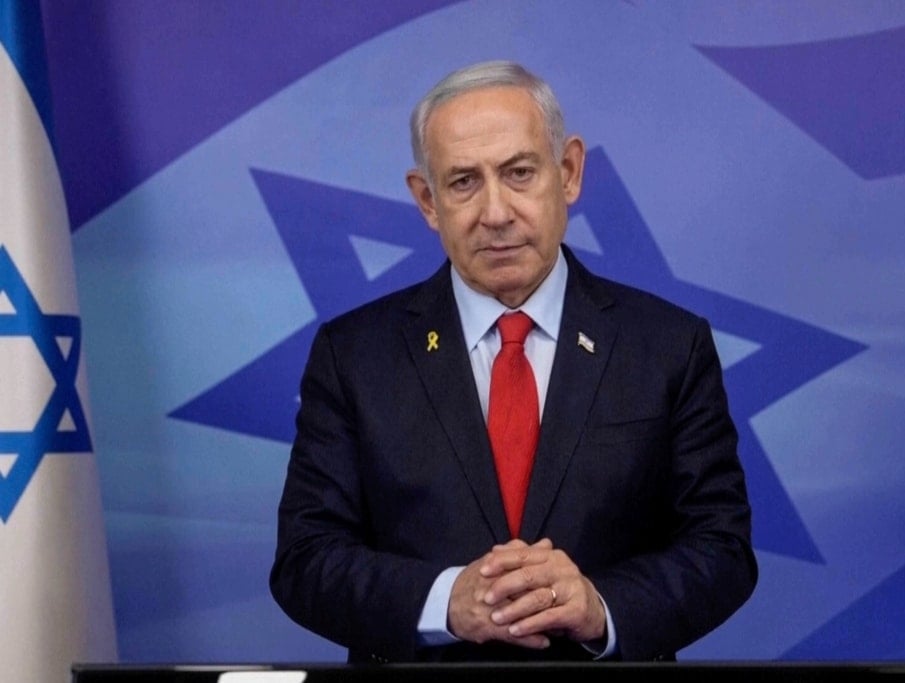US rejects Netanyahu claims about 'threats' to force Lebanon ceasefire
The United States rejects claims made by Israeli Prime Minister Benjamin Netanyahu about having threatened him to accept the ceasefire deal with Lebanon.
-

In this screengrab image from a video provided by the Israeli Government Press Office, Israeli Prime Minister Benjamin Netanyahu makes a televised statement Tuesday, November 26, 2024, in occupied al-Quds, occupied Palestine (AP)
The United States has dismissed Israeli Prime Minister Benjamin Netanyahu's claims that American threats forced the Israeli occupation to accept a ceasefire agreement with Hezbollah, Haaretz reported on Wednesday. Contradictory narratives have emerged from Netanyahu's office and Washington regarding the extent of US involvement in brokering the deal.
Israeli officials alleged that the Biden administration issued two significant threats: halting US arms shipments to the Israeli occupation and withholding its veto in the UN Security Council. These claims were categorically denied by American officials, who described their role as mediation rather than coercion.
An anonymous senior US official stated, "At no point was there any threat to withhold a Security Council veto or to suspend arms shipments. This agreement was reached through dialogue, not ultimatums."
Throwing blame on the US
Netanyahu's aides reportedly briefed journalists to build public support for the ceasefire by portraying it as an unavoidable decision imposed by the US. Analysts suggest this narrative is intended to counter criticism from the Israeli occupation's right-wing factions, which oppose any concessions to Hezbollah and Lebanon.
US officials countered this claim, emphasizing that Netanyahu was a willing partner in the negotiations. "The idea of US threats is a fabrication to appease domestic critics," said a senior Biden administration official.
The Biden administration is keen to use the Lebanon ceasefire as a model to push for a ceasefire in Gaza. However, this effort faces significant resistance within Netanyahu's coalition. Far-right ministers Itamar Ben-Gvir and Bezalel Smotrich have warned they may withdraw from the government if such an agreement is pursued.
Netanyahu's considerations are also influenced by the political transition in Washington, with Donald Trump set to assume the presidency soon. US officials believe Netanyahu seeks to avoid straining relations with Trump, which may explain his willingness to finalize the Lebanon agreement while resisting similar moves regarding Gaza.
Ceasefire announcement
US President Joe Biden announced on Tuesday that the governments of "Israel" and Lebanon had accepted a proposal to end the war. "I just spoke with the prime ministers of Israel and Lebanon and I'm pleased to announce that their governments have accepted the United States' proposal to end the devastating conflict between Israel and Hezbollah," he said.
During remarks from the White House, Biden confirmed that the ceasefire deal will take effect on Wednesday starting at 4 am local time.
"This is designed to be a permanent cessation of hostilities," he added, thanking French President Emmanuel Macron for his "partnership in reaching this moment."
Biden said the Lebanese Army would regain control over its territory following the implementation of the ceasefire agreement.
"Over the next 60 days, Israel will gradually withdraw its remaining forces and civilians — civilians on both sides will soon be able to safely return to their communities and begin to rebuild their homes," the US President indicated.
Seeking to attribute the ceasefire agreement to the effort of his administration, Biden said the acceptance of the proposal by both "Israel" and Lebanon "brings us closer to realizing the affirmative agenda" of his presidency, which, according to him, envisions a Middle East that is "at peace and prosperous, and integrated across borders."
Echoing Israeli Prime Minister Benjamin Netanyahu's earlier statements, Biden said "Israel" "retains the right to self-defense" in the event that Hezbollah, or any other party, allegedly violates the newly announced agreement.

 4 Min Read
4 Min Read








